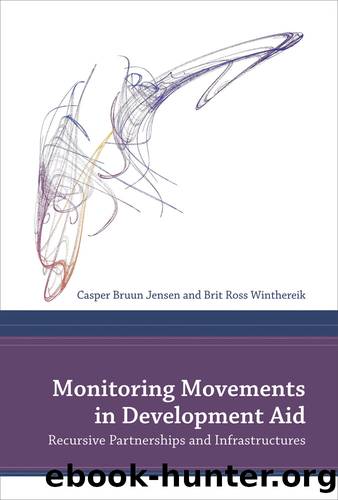Monitoring Movements in Development Aid by Jensen Casper Bruun;Winthereik Brit Ross; & Brit Ross Winthereik

Author:Jensen, Casper Bruun;Winthereik, Brit Ross; & Brit Ross Winthereik [Jensen, Casper Bruun]
Language: eng
Format: epub
ISBN: 3339672
Publisher: MIT Press
Published: 2013-09-10T00:00:00+00:00
5
Weedy Infrastructure: Monitoring Environmental Partnerships
Monitoring in Partnerships
In previous chapters we described some inventive initiatives that aim to create better platforms for knowledge about aid activities and projectsâknowledge that is meant to be beneficial not only to aid organizations but also to policy makers and to various publics. A study of these endeavors, however, didnât get us in touch with any actual aid development projects. So far, we have heard little about how such projects operate, or about how accountability and transparency matter to the people who instigate them. And we have heard next to nothing about the infrastructures for accountability, transparency, and knowledge making that are already in placeâthe infrastructures that aid organizations currently rely on in their daily operations. Yet such infrastructures do exist, and, as we shall see, they too are inventive in their own ways. These ways, however, have little to do with cutting-edge technological innovation or macro-level knowledge sharing. Rather, such aid information infrastructures result in the invention of organizational and collaborative practices. As Frederick Cooper and Randall Packard say, âmuch development knowledge is down to earthâ (1997a, 18).
Nevertheless, these kinds of practical inventions are also hugely important. They concern always urgent questions about how development consultants can gain knowledge about aid projects taking place all over the world and, centrally, how such knowledge can be transported back and forth between aid headquarters, donorsâ offices, and non-governmental organizationsâ project sites. In this context, infrastructure making and the knowledge practices that undergird it are themselves political. Indeed, infrastructure making is part of an ontological transformation that reshapes what the politics of development aid is and what it can be.
This chapter focuses on âmonitoring and evaluationâ (âM&Eâ) in the Conservation Department of the Danish office of NatureAid. NatureAid Denmark has an executive board and a secretary general. It is divided into three departments: Conservation, Fundraising, and Communication. Located on the renovated third floor of an office building in a run-down part of central Copenhagen, the three departments share a large, semi-open office space. Our fieldwork centered on monitoring and evaluation activities in the self-described âThird World Teamâ of the Conservation Department.1
In recent years, NatureAid has been short on funds. In this situation, the Copenhagen office has worked to produce new forms of evidence of the effectiveness of its projects. Occasionally, such evidence can be brought to the table during negotiations with donors or other stakeholders. More often, it is simply part of everyday routines. Formal systems of representation are deeply embedded in this infrastructure, and standardized documentation and reporting formats are omnipresent in the officeâs work.
We entered NatureAidâs office by signing a standardized form, called the âterms of reference,â that had been drafted and revised through negotiations with the head of the Conservation Department. The terms defined our partnership with NatureAid and stipulated that we would be allowed to study its accountability practices for a year. In return, we would organize two workshops during which staff members would be invited to reflect on existing modes of âdoing accountabilityâ in the organization.
Download
This site does not store any files on its server. We only index and link to content provided by other sites. Please contact the content providers to delete copyright contents if any and email us, we'll remove relevant links or contents immediately.
Cecilia; Or, Memoirs of an Heiress — Volume 1 by Fanny Burney(32080)
Cecilia; Or, Memoirs of an Heiress — Volume 3 by Fanny Burney(31471)
Cecilia; Or, Memoirs of an Heiress — Volume 2 by Fanny Burney(31422)
The Great Music City by Andrea Baker(30801)
We're Going to Need More Wine by Gabrielle Union(18648)
All the Missing Girls by Megan Miranda(14805)
Pimp by Iceberg Slim(13808)
Bombshells: Glamour Girls of a Lifetime by Sullivan Steve(13706)
Fifty Shades Freed by E L James(12928)
Talking to Strangers by Malcolm Gladwell(12893)
Norse Mythology by Gaiman Neil(12866)
For the Love of Europe by Rick Steves(11580)
Crazy Rich Asians by Kevin Kwan(8903)
Mindhunter: Inside the FBI's Elite Serial Crime Unit by John E. Douglas & Mark Olshaker(8727)
The Lost Art of Listening by Michael P. Nichols(7172)
Enlightenment Now: The Case for Reason, Science, Humanism, and Progress by Steven Pinker(6884)
The Four Agreements by Don Miguel Ruiz(6330)
Bad Blood by John Carreyrou(6286)
Weapons of Math Destruction by Cathy O'Neil(5854)
